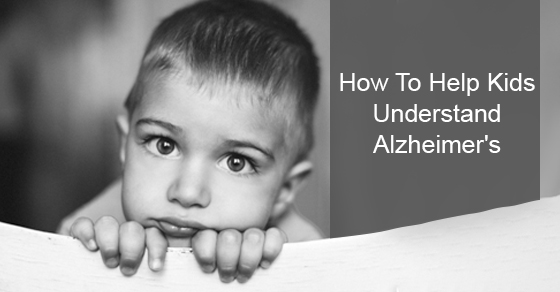Let’s face it. When a family member develops Alzheimer’s or Dementia, it affects the entire family in some way. Caring for a parent in their home or having them move into a family member’s home brings on a myriad of issues. Lots of adjustments must be made. Unfortunately, we sometimes forget about the most vulnerable and sensitive members of the family: the children. Youngsters see things through different eyes and conger up all sorts of misconceptions and fears.

If you are dealing with Alzheimer’s home care, let us give you some direction for how to help kids understand Alzheimer’s.
Don’t Pretend Everything Is The Same
It’s important to spend time with children talking them through changes they are witnessing. Even in the early stages of the disease, explain what is going on in a language a child can grasp. If a loved one with Alzheimer’s has moved into a caregiver’s household, children will be spending more time with them and will be observing the changes in behavior. You can’t hide it from them. Explain that growing older sometimes means you need extra help and care.
Sometimes older people can’t remember things like they could when they were younger. Sometimes they may even forget names, forget what they did last week, and maybe even forget your name. They may even act differently, but we still love them.
Don’t Ignore The Why Questions
The question of WHY? Is something parents hear from children about anything and everything. Do your best to explain why Grandma or Grandpa is acting this way. Try to answer every Why question with a satisfactory answer. If you ignore them, they may think something is terribly wrong.
Grandma is acting this way because some changes happened in her brain as she got older. We are helping her to get through this time.
Children will watch how you act and try to mimic you. Do your best not to get frustrated in their presence.
Reassure Them
-
- Explain that no one is to blame, especially them, if that is an issue.
- Tell them it’s OK to feel sad.
I feel sad this is happening too, but Grandma is still with us, and we can help her.
-
- Fear is a common reaction in children, so reassure them that nobody else is going to act this way or “catch” the disease.
- Acknowledge that with Alzheimer’s home care, frustrations or anger can happen.
I sometimes get frustrated when Grandma keeps asking me the same question over and over. She’s not doing it to upset me, I just try to be patient and remember she needs our help.
- Encourage them to play games or look at old photos of their grandparent. They’ll feel like they are helping too.
Watch out for anger issues. If children feel they are being neglected because of their grandparents, they may act out at school or home craving your attention. You can find some additional resources for children and teens here.
If it becomes too much to handle alone, look to Alzheimer’s home care from C-Care Home Health Services.

